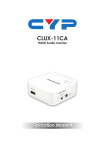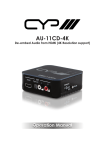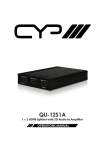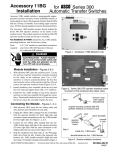Download Cypress CLUX-11CD Specifications
Transcript
CLUX-11CD HDMI Audio Extractor Operation Manual DISCLAIMERS The information in this manual has been carefully checked and is believed to be accurate. Cypress Technology assumes no responsibility for any infringements of patents or other rights of third parties which may result from its use. Cypress Technology assumes no responsibility for any inaccuracies that may be contained in this document. Cypress also makes no commitment to update or to keep current the information contained in this document. Cypress Technology reserves the right to make improvements to this document and/or product at any time and without notice. COPYRIGHT NOTICE No part of this document may be reproduced, transmitted, transcribed, stored in a retrieval system, or any of its part translated into any language or computer file, in any form or by any means— electronic, mechanical, magnetic, optical, chemical, manual, or otherwise—without express written permission and consent from Cypress Technology. © Copyright 2011 by Cypress Technology. All Rights Reserved. Version 1.1 August 2011 TRADEMARK ACKNOWLEDGMENTS All products or service names mentioned in this document may be trademarks of the companies with which they are associated. SAFETY PRECAUTIONS Please read all instructions before attempting to unpack, install or operate this equipment and before connecting the power supply. Please keep the following in mind as you unpack and install this equipment: • Always follow basic safety precautions to reduce the risk of fire, electrical shock and injury to persons. • To prevent fire or shock hazard, do not expose the unit to rain, moisture or install this product near water. • Never spill liquid of any kind on or into this product. • Never push an object of any kind into this product through any openings or empty slots in the unit, as you may damage parts inside the unit. • Do not attach the power supply cabling to building surfaces. • Use only the supplied power supply unit (PSU). Do not use the PSU if it is damaged. • Do not allow anything to rest on the power cabling or allow any weight to be placed upon it or any person walk on it. • To protect the unit from overheating, do not block any vents or openings in the unit housing that provide ventilation and allow for sufficient space for air to circulate around the unit. REVISION HISTORY VERSION NO. DATE DD/MM/YY SUMMARY OF CHANGE VS1 06/11/12 First Release VS2 27/12/12 Reword the feature and the statements for audio EDID CONTENTS 1. Introduction�������������������������������������������� 1 2. Applications������������������������������������������� 1 3. Package Contents�������������������������������� 1 4. System Requirements���������������������������� 1 5. Features�������������������������������������������������� 2 6. Operation Controls and Functions������� 3 6.1 Top Panel������������������������������������������3 6.2 Right Panel����������������������������������������4 6.3 Left Panel������������������������������������������4 6.4 Front Panel����������������������������������������5 6.5 Rear Panel�����������������������������������������5 7. Connection Diagram���������������������������� 6 8. Specifications���������������������������������������� 7 9. Acronyms����������������������������������������������� 8 1. INTRODUCTION The HDMI Audio Extractor allows you to extract audio signals from your HDMI source. When connecting to a TV or display you don’t always get the best audio, or in the case of a PC monitor, no audio at all. So with this Audio Extractor you can take your original HDMI audio signal and convert it to digital optical or analog Stereo (L/R) audio. This means that you can output your audio signal to external speakers or extend your audio signal pathway. 2. APPLICATIONS • Audio extraction for video only displays • Extend your audio signal • Audio extraction for non-HDMI AV receivers or wider audio systems 3. PACKAGE CONTENTS • HDMI Audio Extractor • 5 V/1.2 A Power Adaptor • Operation Manual 4. SYSTEM REQUIREMENTS HDMI equipped source device and display (TV/monitor) and/or amplifier/active speakers with connection cables. 1 5. FEATURES • Compliant with HDMI, HDCP 1.2 and DVI 1.0 • Supports HDMI audio sampling rates up to 192 kHz • Supports Optical S/PDIF sampling rates up to 48 kHz • Supports TMDS clock frequency rate 225 MHz • Supports high-bit-rate (HBR) audio • No HDMI output connection is required to receive audio at the analog and optical outputs • Maximum input and output HDMI cable length can run up to 15 meters at 1080p at 8-bit resolution • Low power consumption • Supports EDID management for audio formats, can switch among built-in EDID (LPCM 2CH/Bitstream) and external EDID (TV) • Supports 3D signal 2 6. OPERATION CONTROLS AND FUNCTIONS 6.1 Top Panel Power 1 Link 2 HDMI Audio Extractor 1 Power LED: The Power LED will illuminate in blue when the unit is connected to the power supply and switched on. 2 Link LED: The Link LED will illuminate in green when both the source and the display are connected and have established a link. This LED will also blink once while the power is turned on. 3 6.2 Right Panel Bitstream TV 2CH LPCM 1 Power 2 1 TV/Bitstream/2CH LPCM: This switch allows users to select the source's audio EDID. TV Mode: Switch to TV mode for the HDMI source to output audio per the EDID of connected TV or AV receiver, supports up to LPCM 7.1 channels. Bitstream Mode: Switch to Bitstream mode for the HDMI source to output Bitstream audio per the built-in EDID, supports up to compressed audio 5.1 channels. 2CH LPCM Mode: Switch to 2CH LPCM mode for the HDMI source to output LPCM 2 channels audio per the built-in EDID. Note: Depending on the input audio format, the unit may not output audio through all output port., For example, the L/R analog output port will have no audio when the input audio format is other than LPCM 2CH. 2 Power: Switches the unit ON or puts the device into standby mode. 6.3 Left Panel DC 5V 1 1 DC 5V: Connect to the 5V DC power supply into the unit and plug the adaptor to an AC wall outlet. 4 6.4 Front Panel HDMI In 1 1 HDMI In: Connect to a source device such as a DVD/Blu-ray player with an HDMI cable. 6.5 Rear Panel HDMI Out Optical 1 2 L R 3 1 HDMI Out: Connect to the display (TV/monitor) with an HDMI cable for video and audio signal output. No HDMI output connection is required to send audio through the analog and optical outputs. 2 Optical Out: Connect to audio equipment such as an amplifier or Hi-Fi system with an optical cable for digital audio output. Supports up to bitstream audio 5.1CH and LPCM 2CH. 3 L/R Out: Connect to audio equipment such as an amplifier or active speakers with a stereo RCA cable for audio output. Supports analog stereo output only. 5 7. CONNECTION DIAGRAM DVD or Blu-ray Player HDMI Input HDMI In HDMI Audio Extractor HDMI Out Optical L R Analog Stereo Output HDMI Output Digital Audio Output (Optical) Display Amplifier 6 8. SPECIFICATIONS Input Port 1×HDMI HDMI Audio Sampling Rate Up to 192 kHz Optical Audio Sampling Rate Up to 48 kHz Output Ports 1×HDMI, 1×Optical,1×L/R HDMI Audio Format LPCM 2/5.1/7.1CH, Dolby 5.1, DTS 5.1, DD+, D-TrueHD & DTS-HD Optical Audio Format LPCM 2CH, Dolby 5.1 & DTS 5.1 L/R Audio Format Analog Stereo 2CH Power Supply 5 V/1 A linear power adaptor (US/EU Standards, CE/FCC/UL Certified) Or 5 V/1.2 A switching power adaptor (with universal plug, CE/FCC/UL certified) ESD Protection Human body model: ± 8kV (air-gap discharge) ± 6kV (contact discharge) Dimensions 90.7 mm (W)×85.8 mm (D)×34 mm (H) Weight 107 g Chassis Material Plastic Silkscreen Color White Operating Temperature 0 ˚C~40 ˚C/32 ˚F~104 ˚F Storage Temperature −20 ˚C~60 ˚C/−4 ˚F~140˚F Relative Humidity 20 ~ 90 % RH (non-condensing) Power Consumption 2.1 W 7 9. ACRONYMS ACRONYM COMPLETE TERM HDCP High-bandwidth Digital Content Protection HDMI High-Definition Multimedia Interface 8 CYPRESS TECHNOLOGY CO., LTD Home page: http://www.cypress.com.tw 20121106 MPM-CLUX11CD

























